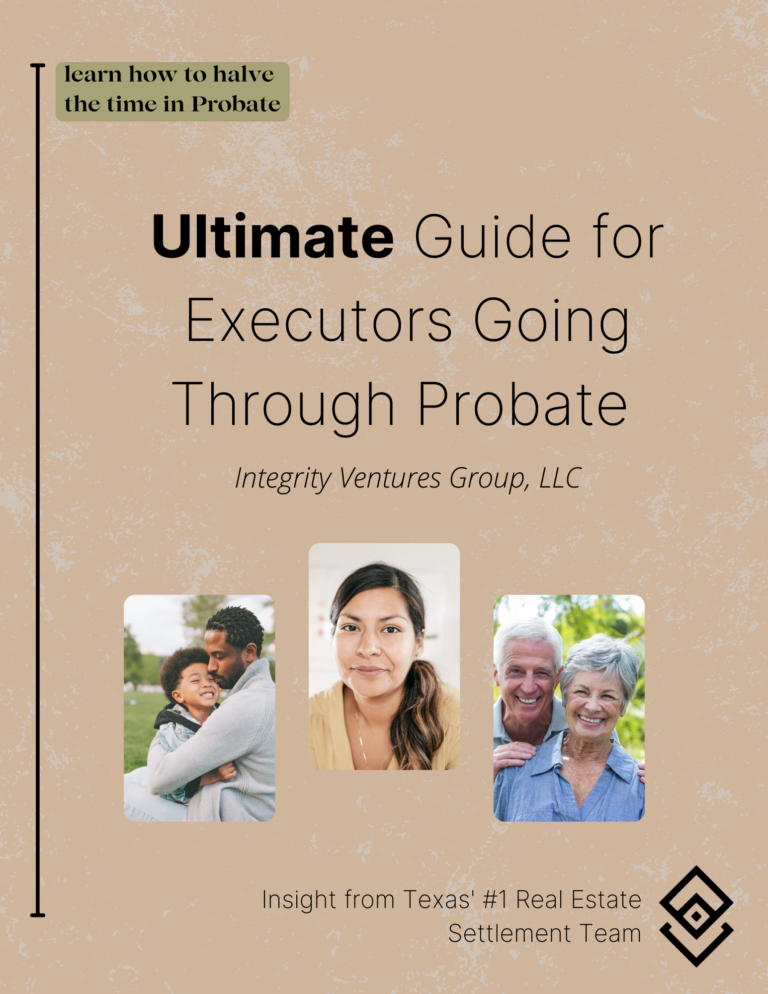do you want to cut your probate Process time in half?
Probate Timeline in Texas: How Long Does the Probate Process Take?
disclaimer
Integrity Ventures Group asserts that it is not a licensed lawyer, and this article is intended solely for providing general guidance and information, and should not be considered as legal advice or a substitute for consulting with a qualified attorney. For any specific legal grievances related to personal probate cases, we strongly advise individuals to seek professional legal counsel and engage the services of a licensed attorney.
At Integrity Ventures Group, we pride ourselves on being the premier estate settlement firm in Texas. Our expertise lies in assisting families daily, helping them unravel the complexities of their probate proceedings alongside their attorneys. We would be honored to extend our knowledge to help guide you through your unique journey as well. Let’s Dive into: the probate timeline in Texas.
Introduction
Probate, the legal process of transferring assets and settling debts after someone passes away, often comes with many questions, concerns, and misconceptions. One of the most frequently asked questions is, “How long does the probate process take?” In Texas, the timeline can vary significantly depending on numerous factors. In this comprehensive guide, we will delve deep into the Texas probate timeline, giving you a thorough understanding of what to expect at each stage.
Table of Contents
- Initial Steps: Filing for Probate
- The Waiting Period: Mandatory Notices
- Inventory, Appraisement, and List of Claims
- Handling Debts and Taxes
- Asset Distribution
- Final Settlement and Closing
- Exceptions and Complications
- Tips for Expediting the Probate Process
- Frequently Asked Questions
- Final Thoughts
Initial Steps: Filing for Probate (Weeks 1-2)
Locating the Will
The first step in the Texas probate process is locating the will, if one exists. The will should be filed with the county clerk in the Texas county where the deceased resided.

Application for Probate
Once the will is located, the next step is filing an “Application for Probate” at the probate court in the same county. This application typically includes essential information about the deceased, the executor named in the will, and an overview of the estate.
The Waiting Period: Mandatory Notices (Weeks 2-4)
Texas law mandates a waiting period of approximately two weeks following the application’s filing. During this period, the court will publicly post a notice regarding the application. This serves as a formal notice to any potential creditors or other interested parties. Additionally, direct notices must be sent to heirs, beneficiaries, and sometimes creditors, depending on the situation.
Inventory, Appraisement, and List of Claims (Weeks 5-12)
After the waiting period, the next significant milestone involves the court formally appointing the executor. Once appointed, the executor has 90 days to submit the following:
- An inventory of estate assets
- An appraisal of asset values
- A list of claims against the estate
This step can take time, depending on the complexity and size of the estate.
Handling Debts and Taxes (Weeks 13-26)
After the inventory and appraisal, the executor focuses on settling the estate’s debts and any pending taxes. These include:
- Funeral expenses
- Medical bills
- Outstanding debts
- Federal and state taxes
In some cases, the executor might need to liquidate assets to cover these costs. The Internal Revenue Service (IRS) typically requires estate tax returns within nine months, but extensions may be possible.
Asset Distribution (Weeks 27-52)
After debts and taxes are settled, the next phase is distributing the remaining assets to beneficiaries as per the will or state law, if there’s no will. This phase can be relatively straightforward or incredibly complex, depending on factors like:
- The clarity of the will
- The types of assets involved
- Whether there are disputes among beneficiaries
Final Settlement and Closing (Around One Year)
Once all assets are distributed, the executor files a final settlement report with the court, detailing how assets were managed and distributed. Upon approval, the court formally closes the estate.
Exceptions and Complications that Could Extend the Timeline
- Contested Wills: Legal challenges to the will can add months or even years.
- Complex Estates: Larger, more complex estates naturally take longer to administer.
- Unclear Wills: Wills that are vague or poorly drafted can lead to delays.
- Missing Heirs or Beneficiaries: Locating missing or unknown heirs can extend the timeline.
Tips for Expediting the Probate Process
- Hire an Experienced Probate Attorney: Legal guidance can streamline the process and help avoid mistakes that cause delays.
- Organization: Keep all documents well-organized.
- Effective Communication: Clear communication between the executor, beneficiaries, and creditors can help avoid misunderstandings and disputes.
Frequently Asked Questions
Can Probate be Avoided in Texas?
In some cases, yes. Assets with designated beneficiaries, joint tenancies, and those placed in trusts often bypass probate.
Can I Act as My Own Executor?
Yes, but the complexities involved often make hiring an attorney advisable.
Final Thoughts
In an uncomplicated case, probate in Texas can be finalized in about a year. However, various factors can extend this timeline considerably. Understanding what each phase involves, what can go wrong, and what you can do to expedite the process can help set realistic expectations.
FIND MORE HELPFUL ARTICLES LIKE THIS ONE
DOWNLOAD YOUR PROBATE CHECKLIST TODAY.
Become a part of the numerous executors who have already benefited from our free guide. Elevate your probate process with our complimentary probate checklist, designed to guide you step by step through the process of selling your real estate property today. Download it now and streamline your journey through probate.






